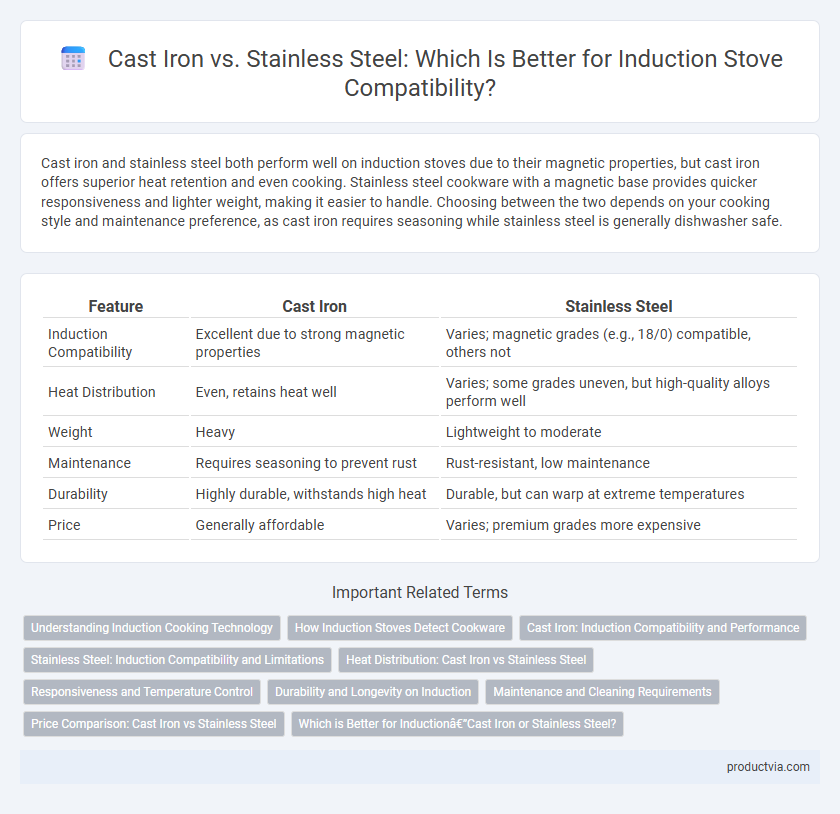Cast iron and stainless steel both perform well on induction stoves due to their magnetic properties, but cast iron offers superior heat retention and even cooking. Stainless steel cookware with a magnetic base provides quicker responsiveness and lighter weight, making it easier to handle. Choosing between the two depends on your cooking style and maintenance preference, as cast iron requires seasoning while stainless steel is generally dishwasher safe.
Table of Comparison
| Feature | Cast Iron | Stainless Steel |
|---|---|---|
| Induction Compatibility | Excellent due to strong magnetic properties | Varies; magnetic grades (e.g., 18/0) compatible, others not |
| Heat Distribution | Even, retains heat well | Varies; some grades uneven, but high-quality alloys perform well |
| Weight | Heavy | Lightweight to moderate |
| Maintenance | Requires seasoning to prevent rust | Rust-resistant, low maintenance |
| Durability | Highly durable, withstands high heat | Durable, but can warp at extreme temperatures |
| Price | Generally affordable | Varies; premium grades more expensive |
Understanding Induction Cooking Technology
Cast iron and stainless steel differ significantly in induction stove compatibility due to their magnetic properties; cast iron is highly magnetic, making it one of the best materials for induction cooking, ensuring efficient heat transfer. Stainless steel's compatibility depends on its composition, with magnetic grades like 18/0 performing well, while non-magnetic variants such as 18/8 fail to work on induction cooktops. Induction cooking technology relies on creating an electromagnetic field that generates heat directly in the cookware, so magnetic permeability is critical for optimal performance and energy efficiency.
How Induction Stoves Detect Cookware
Induction stoves detect cookware through magnetic fields, requiring pots and pans made from ferromagnetic materials like cast iron or certain stainless steel grades. Cast iron is highly compatible due to its strong magnetic properties, ensuring efficient heat transfer and responsiveness on induction surfaces. Some stainless steel cookware may not work unless it contains enough magnetic elements, so checking for induction compatibility is crucial before use.
Cast Iron: Induction Compatibility and Performance
Cast iron exhibits excellent induction compatibility due to its high magnetic permeability, allowing it to heat efficiently and evenly on induction cooktops. Its superior heat retention ensures consistent cooking temperatures, making it ideal for slow simmering and searing. Despite its heavier weight and maintenance requirements, cast iron's durability and performance make it a preferred choice for induction stove users seeking reliable cookware.
Stainless Steel: Induction Compatibility and Limitations
Stainless steel cookware is generally compatible with induction stoves due to its magnetic properties, especially when it contains a high percentage of ferromagnetic materials like iron. However, not all stainless steel is induction-friendly, as some grades with higher nickel content lack the necessary magnetic response. The performance on induction cooktops may also vary depending on the cookware's base thickness and construction, which affects heat distribution and efficiency.
Heat Distribution: Cast Iron vs Stainless Steel
Cast iron excels in heat retention and even heat distribution, making it ideal for slow, consistent cooking on induction stoves. Stainless steel offers faster heating but often distributes heat unevenly, resulting in potential hot spots that can affect cooking precision. Optimal induction cookware frequently combines stainless steel with an iron or magnetic stainless base to balance heat distribution and magnetic compatibility.
Responsiveness and Temperature Control
Cast iron offers excellent heat retention and even temperature distribution on induction stoves, providing consistent cooking performance but responds slower to temperature changes. Stainless steel, especially magnetic grades like 18/0 or 18/8, heats up and cools down rapidly, enabling precise temperature control and quick adjustments. For users prioritizing responsiveness, stainless steel cookware enhances induction cooking accuracy, while cast iron excels in maintaining steady heat for simmering and slow cooking tasks.
Durability and Longevity on Induction
Cast iron cookware offers exceptional durability and maintains its structural integrity over decades of use on induction stoves, resisting warping and high temperatures effectively. Stainless steel pans designed with magnetic-grade bases ensure strong induction compatibility but may vary in longevity depending on the quality of the alloy and base construction. For long-term performance on induction cooktops, cast iron stands out due to its robust nature, while high-quality stainless steel delivers reliable durability when properly engineered for induction heating.
Maintenance and Cleaning Requirements
Cast iron cookware requires regular seasoning to maintain its non-stick surface and prevent rust, making cleaning more labor-intensive compared to stainless steel. Stainless steel is easier to clean and more resistant to stains and corrosion, requiring only basic cleaning with soap and water without special maintenance. Both materials work on induction stoves, but stainless steel offers a more convenient cleaning routine and lower maintenance effort.
Price Comparison: Cast Iron vs Stainless Steel
Cast iron cookware generally offers a more affordable option for induction stoves, with prices typically ranging from $20 to $70, depending on brand and quality. Stainless steel sets for induction cooking usually start around $50 and can exceed $200, reflecting differences in manufacturing complexity and design. Budget-conscious buyers seeking efficient induction compatibility often find cast iron provides better value, while stainless steel offers durability and aesthetic appeal at a higher cost.
Which is Better for Induction—Cast Iron or Stainless Steel?
Cast iron offers superior induction compatibility due to its excellent magnetic properties and even heat distribution, making it highly efficient on induction stoves. Stainless steel varies in induction compatibility depending on its magnetic quality; only magnetic grades like 18/0 work effectively, while austenitic types such as 18/8 or 18/10 do not. For induction cooking, cast iron is generally better, but high-quality magnetic stainless steel can provide durability and easier maintenance while still functioning well on induction cooktops.
Cast iron vs Stainless steel for induction compatibility Infographic

 productvia.com
productvia.com